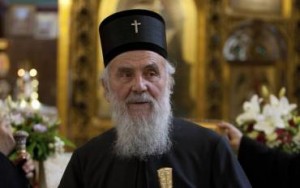One of my parishioners told me last week that a relative of hers is looking into Orthodox Christianity. When I asked her why she was looking, the answer surprised me. She said that her aunt is beginning to read about Orthodox Christianity because, as she put it, “she had rode the Charismatic bus to the end of the line.”
I think I know what she means. In my Protestant days, I was a Baptist Charismatic with Word of Faith influence, a Four Square Pentecostal, and a close friend of the Vineyard Christian fellowship. I even did a couple of years stint in YWAM. I too rode the Charismatic bus to the end of the line.
In the Protestant Charismatic and Pentecostal world as I experienced it, there seemed to be a progression of Christian experience that went something like this: First you are saved, which means that you have an encounter with Christ in which you accept Christ; that is, you accept the fact that Christ died for (read: instead of) you on the Cross. This salvation was considered real if it included an embrace of traditional American “family” values (especially in the Baptist and Pentecostal circles I was in) and the cessation of “worldly behaviour.” Worldly behaviour was defined variously, but generally included (but was not limited to) the following: smoking (anything), drinking alcohol, dancing (except as worship in church) and going to places where people smoke, drink and/or dance. I realize that not all Charismatic groups put the same emphasis on the cessation of clearly defined “worldly” behaviours, but most of the groups I was associated with did.
After one was saved, the next step was to be filled with the Spirit. This generally involved an emotional/spiritual experience, generally with the laying on of hands, and was often accompanied by glossolalia, or speaking in tongues. This second phase of the Charismatic Christian experience often included teaching about spiritual gifts and encouragement that one practice “functioning” in one’s spiritual gift. Alternately, especially in the Vineyard circles I haunted, “inner healing” functioned as a cathartic spiritual (and usually very emotional) experience. This second stop on the Charismatic bus line might be summarized as being healed and empowered, and was followed by ministry and outreach.
The last stop along this Charismatic Christian line is ministry or outreach. Having been saved, healed, filled with the Holy Spirit and equipped through the laying on of hands or teaching (which is sometimes considered an additional stop or an alternative stop to #2 for non-Charismatics), one is then expected to give oneself to ministry. This ministry can take many forms, from evangelistic work, to teaching and from administrative work to giving prophetic words. One was supposed to be doing something “for the Kingdom.” Catch phrases like “you are either a missionary or a mission field” were common. Despite this (or perhaps because of this), there is often a great deal of pining that goes on among Charismatics who have been around for awhile and do not yet have something to do in Church that can be readily identified as a ministry. For these, the advice is often the same: Go back to step two. More teaching or more inner healing or more prophetic insight should reveal your ministry to you and remove all blockages to the successful and dynamic functioning of said ministry.
Those who are already confident in their ministry minister with all their heart, as though the eternal destiny of all they come in contact with were at stake: after all, “saved to serve, serve to save,” that’s the driving (though not always spoken) premise of Protestant Charismatic ministry (at least to what I have been exposed to). And sooner or later (more often sooner than later), the active Charismatic minister burns out. Sometimes this burnout takes the form of moral failure of some sort. Other times it takes the form of emotional and physical exhaustion—even to the point of exhibiting symptoms of Post Traumatic Stress Disorder.
At this point of burnout, you are left with three options: either A) take the bus back to the beginning, assuming that perhaps you were not really saved at all (I personally experienced two extra baptisms based on this assumption); or B) you get more inner healing or more education; or C) Having repeated A and B several times already, you give up. People don’t usually give up on God (totally), although some do; rather, most just give up on church as they know it. They cannot deny the reality of their encounters with Christ, yet they cannot go back to where they were before: it is just too painful. Something isn’t working right.
But what if salvation is not just about accepting Christ? What if salvation is the whole process of being conformed into the image of Christ? What if we are not saved to serve? What if we are saved to become like Jesus? I think, for many, this is the appeal of Orthodox Christianity. As Orthodox Christians, we understand salvation to be a process of transformation—a process that takes a lifetime, and even more than a lifetime. If salvation is of the Lord, as the scriptures tell us, then even when I do serve the Church, I am not serving so that others might be saved. The eternal destiny of no one depends on me, the eternal destiny of no one except myself that is. I am called to save myself in Christ, to hide myself in Christ, to find myself in Christ. I am not called to save anyone but myself. And saving myself is merely a matter of learning again and again to accept Christ as the Lord of my life, in ever widening areas of my life, in ever deeper levels of my being. But if I save myself (in Christ), thousands around me will be saved: “A city set on a hill cannot be hidden,” Jesus tells us.
St. Isaac the Syrian tells us that ministry is not unimportant. Yes, we must love one another in practical ways, in ways that are often unique to our personalities, callings in life, resources, and relationships. However, St. Isaac also says, “How beautiful and praiseworthy is the love of neighbor, if only its cares do not distract us from the love of God!” You see, that’s the problem. We get in ministry “mode” and all of our focus is shifted outwards: What does God want me to do? What is God saying to this or that person? What am I supposed to teach? How can I help this or that person or situation? All of our focus is scattered around us and we have very little time or energy to focus on “the one thing needful.” And that one needful thing is to attend to Christ in our hearts.
In the Protestant Charismatic world there are very few resources and spiritual practices that encourage one to develop this one needful thing. In my experience, Bible reading, which was called quiet time, was the only spiritual practice that I was encouraged to engage in. And I must say that nearly all of the enduring spiritual transformation I experienced in those years came out of my quiet times reading the Bible. Nowadays, perhaps there are more resources. One Charismatic Mennonite friend of mine runs a centre for silent retreats. This is certainly a step in the right direction: outer silence may be the beginning of inner stillness.
And yet there is a paradigm problem. In fact, I think it is more than a paradigm problem there is an acute eccleisial problem: The Protestant Charismatic church is just not the Church, not in the full historical and theological sense of the Orthodox Church. I have a regular weekly lunch with some Protestant Charismatic leaders who have become friends of mine, and I explained this problem to them this way: The Charismatics today are much like the Corinthian Church St. Paul wrote to. They love Christ and they are zealous for spiritual gifts; and like the Corinthian Church they sometimes “value giftedness more than character” (by the way, that was a phrase used by one of my Charismatic leader friends). However, the early Church, I pointed out, was terribly persecuted, which in many ways kept most people honest. One is not so tempted to seek ministry if one knows that life and property are on the line. You risked everything to follow Christ. About 250 years later, when the persecution ceased, the monastic movement began in earnest, which in many ways functioned in the same way the persecutions did: it kept people honest. This self-imposed persecution or asceticism again forced one to put it all on the line in order to serve, lead or minister in the Church. And this ascetic way, this desert tradition has continued in the Orthodox Church—to a greater or lesser extent—to this day.
My Charismatic leader friends are amazed that within the Orthodox Church we have all the miracles and signs that the “Corinthians” are zealous for. But what amazes them more is the fact that holiness and character and godliness leading to theosis is what is emphasized. Raising the dead is nothing: Knowing yourself, repenting and becoming transformed into the image of Christ, now that is something.
None of my Charismatic leader friends seem particularly interested in becoming Orthodox. For now, they are interested in learning from Holy Orthodoxy bits and pieces that they can apply in their context, in their paradigm. I keep warning them that the results will not be the same, that Orthodox Christianity is a “whole meal deal.” But still, they keep asking, so I keep giving whatever I can. After all, salvation is of the Lord. I cannot help them. Only the One who is Lord of both me and them can help or save any of us.



















